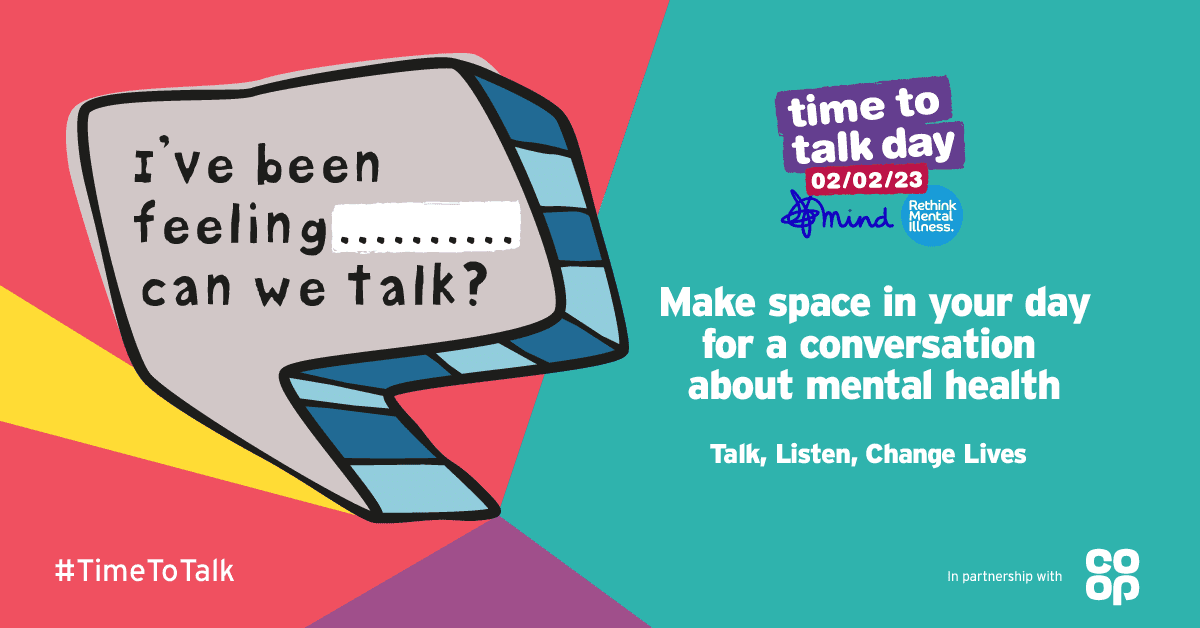
So the first Thursday in February is Time to Talk Day, and the idea behind this particular awareness day is to get us all to talk more about our own mental health, to challenge the all too common stigma that still surrounds mental health and mental illness, particularly the so called ‘less glamorous’ ones, such as psychosis, schizophrenia, and complex post traumatic stress disorder. There isn’t enough time or characters here to list every illness that exists but that doesn’t mean they’re any less than those named.
“The idea behind this particular awareness day is to get us
all to talk more about our own mental health.”
So Time to Talk then. I’ve always felt that what’s meant by “talking” in this context is verbally, as in your classic conversations at the dinner table, over the phone, face to face…those sorts of things. Now, as an autistic person who has struggled with eye contact for her entire life, finds phone calls incredibly stressful, experiences occasional situational mutism and can’t pick up social cues, a lot of this isn’t the easiest thing for me to do, especially if it’s about a subject like mental illness, that may well be hard to speak about…at least to initially start the conversation. That in itself can cause more anxiety and feelings of becoming emotionally overwhelmed.
“We communicate in so many different ways with each other
now, so perhaps Time to Talk should mean ‘Time to
Communicate’. Not the catchiest, but the idea is the same.”
However, I don’t think talking should only be just verbal. After all, it is 2023…we communicate in so many different ways with each other now, so perhaps Time to Talk should mean ‘Time to Communicate’. Not the catchiest, but the idea is the same. Take, for example blogging, like this one, or others on the York Ending Stigma (YES) website. I write a lot more than I actually verbalise (or at least I think I do!) when I talk about my experiences of mental illness, because I often know what I want to say, but can’t always articulate it how I want it to come out as which is very frustrating, and my social anxiety affects this too. I don’t have much problem once I get going thanks to my directness though!
“There is still very much a negative stigma around having a mental illness.”
So now, there’s TikToks, blogs, podcasts, and other bits and pieces to look up as examples compared to a couple of decades ago, when the stigma was much more than it is now. That said, there is still very much a negative stigma around having a mental illness. There are a lot of reasons why this happens, some of it is media perception and stereotyping, some of it is ignorance and fear of something different, misconceptions…and lots of other reasons. I have complex PTSD, social anxiety and generalised anxiety disorder as well as seasonal affective disorder, and yes, I’ve faced my (un)fair share of stigmatising comments such as:
“You don’t look anxious, you can’t be ill”
“People with PTSD are dangerous”
“It’s just anxiety, you just need to calm down” (this one infuriates me)
“What’s wrong with you, can’t you just not be like this?!”
“I’m bored of you having panic attacks”
“These comments, they aren’t always something you can just
let go over your head. They hurt and they make you feel
terrible about yourself when you hear them over and over.”
The thing is, these comments, they aren’t always something you can just let go over your head. They hurt and they make you feel terrible about yourself when you hear them over and over. Mental illness is not easy to live with, which is a massive understatement – as it impacts every single part of your life – as the person living with it, and probably (I can’t speak from personal experience) not easy for anyone who may be caring for the person with mental illness either. But the more we all start to talk, in whichever way that may be, about our mental health, and listen to each other without judgement…because we are all humans after all, the less stigmatising things will eventually become.
Time to Talk Day resources
York Ending Stigma
To find out more about our work and to join us to end mental health stigma in York, please refer to our website https://yorkcvs.org.uk/york-ending-stigma/ or email us on yes@yorkCVS.org.uk
